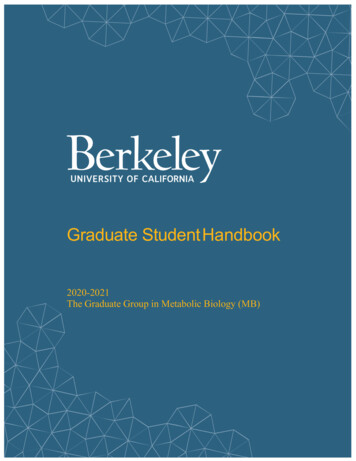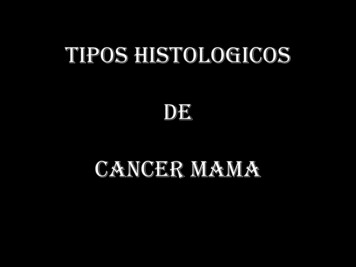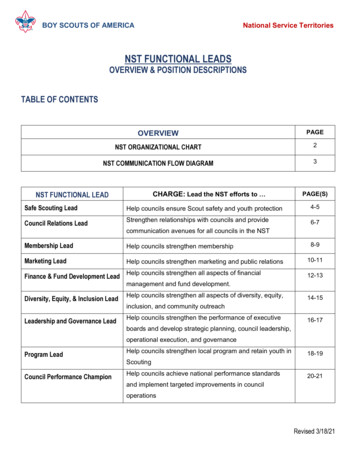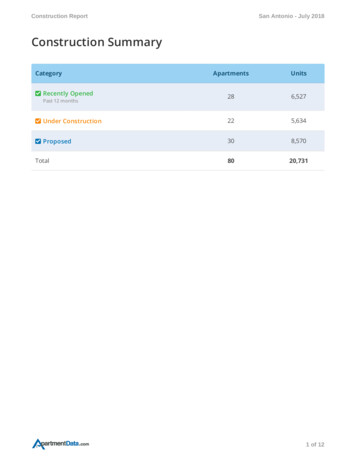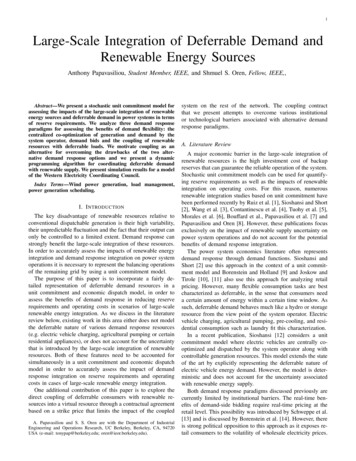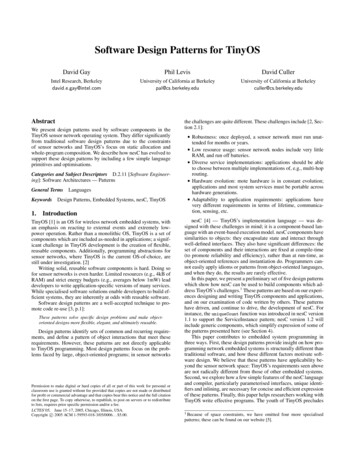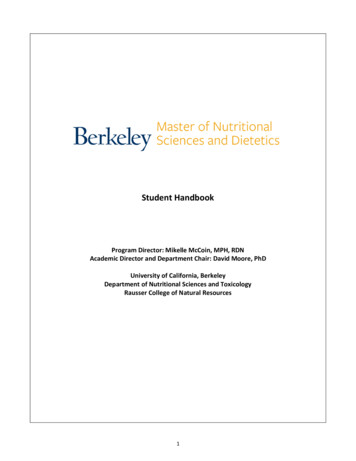
Transcription
Student HandbookProgram Director: Mikelle McCoin, MPH, RDNAcademic Director and Department Chair: David Moore, PhDUniversity of California, BerkeleyDepartment of Nutritional Sciences and ToxicologyRausser College of Natural Resources1
Table of ContentsProgram Description, Mission, and GoalsRequirements for Becoming a Credentialed Registered DietitianAccreditation StatusHistory and Organizational StructureCareer OpportunitiesCurriculumAdmission RequirementsApplication ProcessAccepting the Offer of AdmissionContinued Admission Requirements: Drug Testing, Immunizations, Criminal Background ChecksInsurance RequirementsCost of AttendanceFinancing our Education: Loans, Scholarships and Loan DefermentAcademic and Program CalendarDistance EducationGraduation RequirementsProgram Completion and Issuance of a Verification StatementAdvancing to Candidacy and Maximum Time to Earn a DegreeWithdrawal and Refund of Tuition and FeesProfessional Behavior and ConductMonitoring Student Performance: Assessment of Student LearningLetter of WarningAcademic StandingProgressing in the ProgramRetention and Remediation and Required AdvisingDisciplinary and Termination ProceduresCounseling Into Appropriate Career PathsIllness and TardinessPrior LearningSupervised Experiential Learning: Issuance and Maintenance of Affiliation AgreementsSupervised Experiential Learning: Facility and Preceptor Selection CriteriaSupervised Experiential Learning: Evaluation and Adequacy of Facilities and PreceptorsSupervised Experiential Learning: Hours and Documentation of HoursSupervised Experiential Learning: Student StatusSupervised Experiential Learning: Injuries or Illness While at Supervised Practice SitesSupervised Experiential Learning: Traveling To and From Supervised Practice SitesSupervised Experiential Learning: Compensation From Supervised Practice SitesProtection of Student PrivacyAccess to File and Student RecordsProtected Health Information: HIPAAProcess For Issuing Complaints About the ProgramEquitable Treatment of StudentsAccess to Student Support ServicesInformation For Prospective Students and the PublicContact InformationAppendicesA. Program Goals and ObjectivesB. CompetenciesC. Summary of the Standards of Professional PerformanceD. Code of EthicsE. Signature 435
Program Description, Mission, and GoalsThe Master of Nutritional Sciences and Dietetics (MNSD) Self-Supporting Graduate Professional DegreeProgram at the University of California, Berkeley, prepares students for a career as a registered dietitiannutritionist (RDN)1. Registered dietitian nutritionists are healthcare professionals who strive to improve thenutritional profile of individuals, communities and populations through education, counseling, food andnutrient delivery, program development and policy change. Registered dietitian nutritionists work inhealthcare facilities, schools, community programs, large foodservice operations, and in many other facilitiesad roles.The mission of the Master of Nutritional Sciences and Dietetics (MNSD) at the University of California,Berkeley, is to prepare graduates for practice as registered dietitian nutritionists (RDN) through a professionalgraduate degree program. Using competency-based learning, graduates will achieve the knowledge and skillsto actively contribute to the nutritional sciences and dietetics field through practice, research, leadership andpolicy and become dedicated and inquisitive professionals.The program mission is congruent with the missions of the University of California, the Rausser College ofNatural Resources, the Department of Nutritional Sciences and Toxicology, and the Scope of Practice forRegistered Dietitians.The program’s goals and objectives reflect the program mission. The two program goals include:Program Goal #1: Graduates will apply their knowledge and skills through employment in nutrition anddietetics or health related fields.Program Goal #2: Graduates will have a personal commitment to a high standard of professionalbehavior.The nine program objectives can be found in Appendix A. Upon request, outcome data measuring achievementof program objectives are available to students, prospective students, and the public.The program’s integration of diverse faculty, professional lecturers, courses, and research will provide studentsa deep-rooted foundation in basic sciences and applied dietetics. Students will be exposed to leaders in food,nutrition, research, education, policy and public health through UC and campus initiatives such as the BerkeleyFood Institute, UC Nutrition Policy Institute, campus Basic Needs efforts and collaborations with local schools,nutrition programs and medical facilities. UC Berkeley’s reputation as a world class university and its locationin the Bay Area make it uniquely qualified to offer the training and exposure that will cultivate the futureleaders who will shape nutritional sciences and dietetics research, practice and policy.Courses provide the foundation for the professional training and cover the core content areas of theprofession including nutritional status assessment, clinical nutrition, management and addressing communitiesthrough program development and policy. The courses are designed to prepare students for a graduate-levelof practice and include advanced themes such as quality assurance, resource management, policy evaluation,global and agricultural food production systems, recommending and administering nutrition-relatedpharmacotherapy, and research methods in nutritional sciences. Courses will include experiential learning,such as case studies, role playing, simulations, projects, and will prepare students for their capstone project1In March of 2013 the Academy of Nutrition and Dietetics and the Commission on Dietetic Registrationapproved the optional use of the credential registered dietitian nutritionist (RDN) by registered dietitians. TheRDN is equivalent to the RD credential. This document refers to the registered dietitian as an RDN.3
and supervised practice experiences.The summer session term following year one is dedicated to completing a capstone project in a metabolicbiology research lab or other nutritional sciences focused lab on campus. As a result of this experience,graduates will have a strong science background, will have enhanced problem-solving skills, and will havestrong organizational and professional skills.Student experience and skill development in the courses, laboratories and capstone project will prepare themfor the third component of the program, their supervised practice internships. During the second year studentswill enter the professional work setting for their practical training. The experiences allow the students theopportunity to apply their knowledge and further develop skills related to community program planning,foodservice management, and clinical care in medical centers.Requirements for Becoming a Credentialed Registered Dietitian NutritionistBeginning in January 2024, the requirements for becoming a credentialed registered dietitian nutritionist(RDN) include completion of: (1) the accredited academic coursework, (2) a minimum of 1,000 hours in anACEND-accredited supervised practice program, (3) a minimum of a master’s degree, and (4) upon satisfactorycompletion of these three steps, passage of the Commission on Dietetic Registration credentialing exam. Insome states, graduates also must obtain licensure to practice. Licensure is not required in the state ofCalifornia. Information about other states’ licensure requirements can be found on the Commission on DieteticRegistration website www.cdrnet.org. University of California disclosures about professional licensure andcertification can be found here.The MNSD program at UCB is an ACEND- accredited Future Education Model Graduate Degree program. Theprogram provides the accredited dietetics coursework and supervised practice hours and upon completion,graduates are eligible for the CDR credentialing examination. The Future Education Model (FEM) integrates thedidactic coursework with supervised practice learning in a competency-based curriculum designed to preparenutrition and dietetics practitioners for future practice.The registration examination requirements are set by the Commission on Dietetic Registration. Moreinformation about becoming an RDN and the RDN exam can be found at http://www.cdrnet.org/certifications/Accreditation StatusUniversity of California Berkeley’s Nutrition and Dietetics Graduate Program has been granted candidate statusby Accreditation Council for Education in Nutrition and Dietetics (ACEND) of the Academy of Nutrition andDietetics.Students enrolled in programs with candidacy status will be considered graduate of an ACDEN accreditedprogram and eligible, upon satisfactory completion of the programs, to write the Commission on DieteticRegistration’s Registration Examinations for Dietitians.The Graduate Program accreditation standards integrate didactic coursework with supervised experientiallearning in a competency-based curriculum designed to prepare nutrition and dietetics practitioners for futurepractice. The program meets the 2022 ACEND Accreditation Standards.4
Accreditation Council for Education in Nutrition and Dietetics (ACEND) of the Academy of Nutrition andDietetics, 120 South Riverside Plaza, Suite 2190, Chicago, IL 60606-6995, (312) 899-0040 or (800) 877-1600and https://www.eatrightpro.org/acend.History and Organizational StructureThe University of California at Berkeley is a land grant university created in 1868 when the governor signed theOrganic Act merging the existing College of California and the Agricultural, Mining and Mechanical Arts Collegeto form “a complete university”. In 1873 the university moved from Oakland to its present location in Berkeley,CA. The enrollment at the time was 171 students. Enrollment as of 2021 is approximately 30,000undergraduate students and 11,500 graduate students.Agnes Fay Morgan was hired as the first professor of Home Economics in 1916. She held the role ofdepartment chair from 1918-1954. The Department of Home Economics became the Department ofNutritional Sciences in 1962 and at that time, the building where the department was located was renamedMorgan Hall in her honor. In 2000, to more closely reflect the breadth of teaching and research being done,the department name changed to the Department of Nutritional Sciences and Toxicology. The department ishoused in the Rausser College of Natural Resources (RCNR).A program of study in dietetics and nutrition has been in place since about 1916. Various programs have beenoffered through the years, including a “hospital dietitian’s training course” (1934 UCB General Catalog) and a“curriculum in hospital dietetics” (1954). The latter was a post-baccalaureate program.The presence of an Academy of Nutrition and Dietetics (formerly known as the American Dietetic Association)program is first mentioned in the 1966-67 UCB catalog. In 1971 UCB participated in a pilot study to develop acurriculum for Plan IV and since then it has offered an Accreditation Council for Education in Nutrition andDietetics (formerly known as the Commission on Accreditation for Dietetics Education) approvedundergraduate curriculum. In addition, Berkeley had a Coordinated Undergraduate Program in Dietetics from1973-1992. The Didactic Program in Dietetics (DPD) that is offered today was approved in 1991. It was granteddevelopmental accreditation in 2001 and full accreditation in July 2002. The dietetic internship in the UCBSchool of Public Health closed in April 2007, which left the DPD in the Department of Nutritional Sciences andToxicology (NST) as the only accredited dietetics program at UCB. In 2017, an Individualized SupervisedPractice Pathway (ISPP) was established and accredited by ACEND.With the launching of the MNSD in 2023, the undergraduate DPD and ISPP will slowly be phased out. The lastcohort to enroll in the DPD will be the entering cohort of fall 2023.The MNSD is housed within the Department of Nutritional Sciences in the Rausser College of NaturalResources.Career OpportunitiesA registered dietitian nutritionist is a health professional who assists people of any age to attain optimalnutrition status. RDNs are trained in foods, food preparation and nutrition, as well as associated topics in socialsciences, education, business and management. This background prepares the RDN to apply the science andart of human nutrition to individuals and groups from diverse cultures, with varying nutrition concerns andneeds. There are many different specialties within the field of dietetics, and RDNs often pursue more than one.Some of the major areas include:5
Business and Industry. RDNs may be employed to work in a variety of fields including sales/promotion(marketing), worksite wellness programs, product development, and social media. For example,supermarkets hire RDNs to work in the areas of consumer education & food safety.Clinical Dietetics. As a member of a health care team, a clinical RDNs assesses nutritional needs, developsindividual dietary plans, educates and counsels patients and works with the multidisciplinary team toimprove patient health. Clinical RDNs may work in hospitals, nursing homes, or outpatient settings.Community Dietetics. As a member of the community health team, the community RDNs assessesnutritional needs of population groups. These RDNs plan and coordinate nutritional aspects of programsaimed at improving health and preventing disease in the community.Education. RDNs in this field plan, implement, and evaluate educational experiences for dietetic, medical,dental, nursing or other health students as well as nutrition classes for preschool and K-12 students. Theyare employed by universities, acute care facilities or community programs. Advanced preparation innutrition and education is generally requiredFood Service Management. As part of the management team these RDNs plan, organize, direct andevaluate food service systems. They are actively involved in budgeting, employee training, personnelmanagement, recipe development, establishing and maintaining policies and standards, etc. They maywork in schools, senior centers, healthcare facilities, corporate foodservice operations, prisons, hotels orrestaurants.Private Practice/Consultation. For this field prior experience in dietetic practice in any one of the aboveareas is often necessary. These entrepreneurial RDNs are usually self-employed and provide advice onservices in nutritional care, food service management or consumer education.Research. This field requires advanced preparation in research techniques and, often, an advanced degree.Typically, a research RDNs would work closely with the other investigators in planning and implementingprojects that investigate nutrient needs, functions, interactions, etc., in humans or animals. Researchactivities may be incorporated in all areas of dietetics.Dietetics is a rewarding profession with an encouraging future. The salary range for RDN’s is from about 52,000 114,000 with the median being approximately 72,000 for all RDNs and 82,000 for those working in the Pacificgeographical region (Academy of Nutrition and Dietetics, Compensation & Benefits Survey, 2021). Salaries varyby years in the field, years in position, position held and location. Employment opportunities nationwide areexcellent. The current emphasis on nutrition and health, and preventative health, in this country enhances‘marketability’ of the RDN and identifies the RDN as the only health professional whose primary expertise isnutrition. For more information, consult the Academy of Nutrition and Dietetics website at www.eatright.org.CurriculumThe MNSD integrates the ACEND dietetics coursework and supervised practice training into one seamlesscompetence-based graduate degree program. The coursework for the program meets dietetics accreditationrequirements and prepares students for entry-level practice as an RDN. The graduate program competenciesare the foundation for the coursework and rotations (appendix B).Courses provide the foundation for the professional training and cover the core content areas of theprofession including nutritional status assessment, clinical nutrition, management and addressing communitiesthrough program development and policy. The courses are designed to prepare students for a graduate-levelof practice and include advanced themes such as quality assurance, resource management, policy evaluation,global and agricultural food production systems, recommending and administering nutrition-relatedpharmacotherapy and research methods in nutritional sciences. Courses will include experiential learning, suchas case studies, role playing, simulations, projects, and prepare students for their capstone project and6
supervised practice experiences.The summer session term following year one is dedicated to a capstone project in the metabolic biologyresearch labs or other nutritional sciences focused labs. During this experience, students will investigatenutritional science themes and connect research with their coursework. Students will investigate importanttopics such as: the effect of calorie restriction on oxidative stress, the effect of fructose on circulating levels ofcytokines, how epigenetic factors influence energy metabolism, links between brown adipose tissue andobesity risk, and more. The research capstone experience will culminate in a poster and presentation.Student experience and skill development in the courses, laboratories and capstone project will prepare themfor the third component of the program, their supervised practice internships. During the second year studentswill enter the professional work setting for their practical training. The experiences allow the students theopportunity to apply their knowledge and further develop skills related to community program planning,foodservice management and clinical care in medical centers. Students do not need to find their owninternships. Students will always be regarded as students and in the process of learning, and they will never beused as a replacement for an employee during these experiences.Courses and Course DescriptionsCoursework and Capstone Project (40 required units)NST 208, Foods (4)NST 210, Research Methods & Analysis in Nutritional Sciences (4)NST 235, Food Systems Management (4)NST 245, Counseling in Nutritional Sciences (2)NST 261, Nutritional Assessment and the Lifespan (4)NST 262, Medical Nutrition Therapy (4)NST 266 Nutrition in the Community (3)NST 294, Dietetics Professional Practice Seminar (2)NST 295, Capstone Project in Nutritional Sciences (13)Internship, Supervised Practice (26 required units)NST 400, Professional Preparation: Supervised Practice in Dietetics(approximately: 4-5 weeks of community nutrition, 2 weeks of campus community nutrition, 4-5 weeksof outpatient nutritional care, 6-7 weeks of institutional foodservice management, 16-17 weeks ofclinical nutrition)Course Title: NST 208, Foods with LaboratoryThis course is designed for students to explore the fundamentals of food. The course will begin by discoveringthe science of foods; the functional role of foods as ingredients; and the impact on food quality, acceptabilityand compatibility as measured by sensory evaluation methods. Students will then integrate their knowledge ofchemistry and food science by modifying recipes for wellness and disease prevention and management.Students will explore food preparation techniques and world cuisines to further their appreciation of foods,eating patterns and food trends across cultures. Students will apply principles of food safety and sanitation tothe procurement, storage, and production of foods. This course is designed to prepare MNSD students forsupervised practice internships and a career as a Registered Dietitian Nutritionist. Units: 4Course Title: NST 210 Research Methods & Analysis in Nutritional Sciences with LaboratoryThis course will familiarize students with current methodologies of assessing nutritional status throughmolecular biology, clinical/biochemical analysis, and dietary experimentation and analysis. Upon completion ofthis course, students will understand the work of a nutrition scientist, including asking scientific questions and7
generating hypotheses, using creativity and critical thinking to develop experimental design and execution oflaboratory procedures, as well as interpreting data and presenting (written and oral) findings from resultsobtained. Throughout the course, students will perform several nutritional assessments and compare andcontrast the results to those obtained from a controlled analytical method or specimen. Units: 4Course Title: NST 235, Food Systems ManagementThis course will provide students an opportunity to discuss and apply the organizational and managementprinciples within institutional food service systems. Topics will range from production and delivery systems,management of resources, quality assurance, equipment, layout, marketing, personnel management and fiscalmanagement. Students will apply concepts through laboratory experiences, projects and engagement withinstitutional settings. Units: 4Course Title: NST 245, Counseling in Nutritional SciencesThis graduate-level course will focus on effective nutrition counseling strategies and applying behavior changetheory. Students will address behavior change by applying the Nutrition Care Process and utilize appropriateMedical Nutrition Therapy and theory-driven interventions. Integrated practice will occur through mockcounseling sessions and role playing activities for various populations and conditions. This course is designedto prepare MNSD students for supervised practice internships and a career as a Registered DietitianNutritionist. Units: 2Course Title: NST 261, Nutrition Care Process and the LifespanThis graduate-level course will teach students how to utilize the Nutrition Care Process of the Academy ofNutrition & Dietetics as a framework to explore nutritional care throughout the lifespan. Students willdetermine nutritional status by considering anthropometrics and physical assessment, biochemical data,clinical findings, dietary intake, complimentary and integrative therapies, and physical activity. Diseasepathophysiology, diagnosis, medical and pharmacological treatments, and nutritional therapies and nutritionrelated pharmacotherapy will be discussed for conditions common across the lifespan. Students will beresponsible utilizing medical terminology and documentation and for identifying relevant current research tosupport their nutritional recommendations. This course is designed to prepare MNSD students for supervisedpractice internships and a career as a Registered Dietitian Nutritionist. Units: 4Course Title: NST 262, Medical Nutrition TherapyThis graduate-level course will address nutrition as a component of disease treatment. The Nutrition CareProcess of the Academy of Nutrition & Dietetics will be used as a framework to explore diseasepathophysiology, diagnosis, medical and pharmacological treatments and nutritional therapies. Students willexamine and apply an understanding of complementary and integrative nutritional therapies on drugs,disease and heath. The conditions that will be studied include cardiovascular disease, upper and lower GIdisease, hepatic disease, renal disease, diabetes, diseases of the pancreas, cancer, HIV/AIDS, pulmonarydisease, and critical illness. Students will be responsible utilizing medical terminology and documentation andfor identifying relevant current research to support their nutritional recommendations. This course is designedto prepare MNSD students for supervised practice internships and a career as a Registered DietitianNutritionist. Units: 4Course Title: NST 266 Nutrition in the CommunityThis graduate-level course addresses nutrition in the context of the community and population. It exploresnutrition programs that serve various segments of the population and the relationships of these programs tonutrition policy at the local, national, and international levels. The course provides an opportunity forcommunity assessment, program planning, implementation, and evaluation. The history, science, currentissues and innovations involved in improving nutrition among various communities will be presented.8
Nutritional concerns, including food security and global health, will be discussed. This course is designed toprepare MNSD students for supervised practice internships and a career as a Registered Dietitian Nutritionist.Units: 3Course Title: NST 294, Dietetics Professional Practice SeminarThis course is intended to enhance student understanding and appreciation of professional responsibilities andconduct as future dietetic professionals. Current topics in the field of nutritional sciences and dietetics will bediscussed. The course will provide a platform for students to begin to prepare for the registered dietitiannutritionist credentialing examination. Units: 2Course Title: NST 295, Capstone Project in Nutritional SciencesThe Capstone course gives students the opportunity to synthesize their graduate level course work byconnecting their academic knowledge from their coursework to a capstone research project. Students willlearn new research techniques and approaches and broaden their exposure to nutrition research. The projectwill entail a technical research poster and presentation of their work. Units: 13Course Title: NST 400, Professional Preparation: Supervised Practice in DieteticsThis course will allow students the opportunity to apply their knowledge from their academic courses, buildand practice skills and demonstrate competency as an entry-level registered dietitian nutritionist under thesupervision of a qualified professional. Units: 2-12, 26 requiredNST 400 Rotation Descriptions:Institutional Foodservice Management: In the Institutional Food Service, Production, and ManagementRotation, interns develop skills in marketing, procurement, storage, preparation, delivery, service, qualityand management. Interns practice and operate equipment, conduct sanitation audits, apply HACCPguidelines, plan menus, assess customer service, and apply management skills. Rotation activities includea menu planning project, taking meal orders, patient tray preparation, delivery and satisfaction analysis,food safety and quality audit, a waste and sustainability report, an in-depth themed meal project and aquality improvement project.Clinical: The first 8 weeks of this rotation focuses on practicing the nutrition care process withpopulations with less complex medical conditions impacted by diet including obesity, diabetes,hypertension, cardiovascular disease, neurological conditions, and gastrointestinal disorders. The second8 weeks of this rotation focuses on practicing the nutrition care process with populations with morecomplicated conditions such as renal disease, cancer, hepatic disease, and critical care. Interns applynutrition support. This rotation includes coverage in the Intensive Care Unit. This rotation may be splitbetween multiple facilities. Larger assignments include three mini-case studies, a larger case study withan oral presentation and research review, a quality improvement audit, an in-service to themultidisciplinary team and staff relief.Outpatient Nutritional Care: This rotation focuses on developing skills to provide nutrition services to thecommunity at large through nutrition counseling and nutrition education. Interns spend 3 weeks in anoutpatient medical facility. Major projects include providing nutrition counseling, teaching nutritionfocused classes, development of an education material and understanding billing and coding.Community Nutrition: This rotation focuses on developing skills to provide nutrition services to thecommunity at large through participation in community-based nutrition programs. Major projects includeprogram planning and implementation (needs assessment, intervention, evaluation, marketing), andparticipation in nutrition-related policies.9
Campus Community: The goal of this rotation is to participate in Cal campus community by designing,implementing and evaluating nutrition programs for the campus population.Admission RequirementsAdmissions will include a holistic review including an examination of undergraduate coursework,extracurricular experiences, the personal statement and an interview. All applicants will be ranked per theGraduate Division’s policies.1. A bachelor’s degree or recognized equivalent from an accredited institution2. A satisfactory scholastic average of a minimum grade-point average (GPA) of 3.0 (B) on a 4.0 scale3. Prerequisites include one course of each of the following: General chemistry plus lab Organic chemistry plus lab A second course in general or organic chemistry plus lab Biochemistry Physiology plus lab Biology plus lab Microbiology Statistics Introduction to nutrition** Psychology or sociology or anthropology Nutrient Function and Metabolism (students may take this as a prerequisite or while in theprogram for additional fees)** Metabolic Basis of Human Health and Diseases (students may take this as a prerequisite orwhile in the program for additional fees)****must be taken within the last 5 years4. Students may apply with 2 outstanding prerequisites as long as they can show they will be able tocomplete the courses prior to the start of the program. This excludes the Nutrition Function andMetabolism and Metabolic Basis of Human Health and Disease courses that can be taken while inthe program for an additional program fee.5. Volunteer or work experience, relevant experience is preferred6. Satisfactory interview7. Minimum of 3 letters of recommendation
The MNSD program at UCB is an ACEND- accredited Future Education Model Graduate Degree program. The program provides the accredited dietetics coursework and supervised practice hours and upon completion, . 5.3 Applies project management principles to achieve project goals and objectives.
